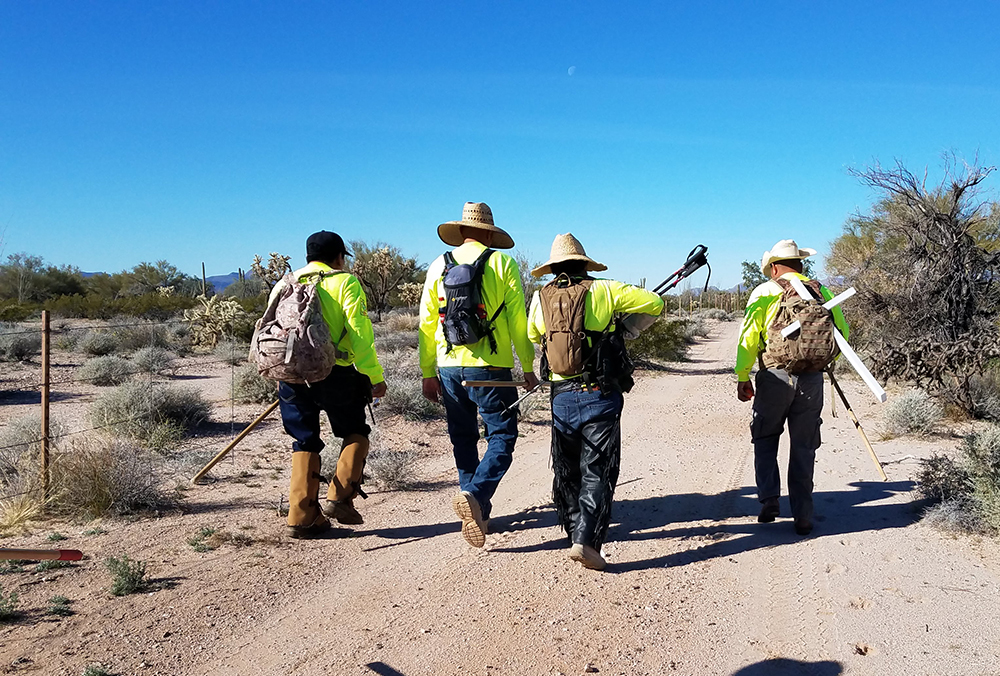
Volunteers from Aguilas del Desierto, a search and rescue organization, search the desert for people crossing the southern border into the United States or who have died in the attempt. (Courtesy of Aguilas del Desierto)
Editor's note: This story, co-produced by NCR and GSR, is the last of a GSR series, "Welcoming the Stranger" on women religious and immigration. It also is among the first articles on Trump's Second Term. Read about how Catholics, NCR and GSR are preparing for Trump's plans for immigrants.
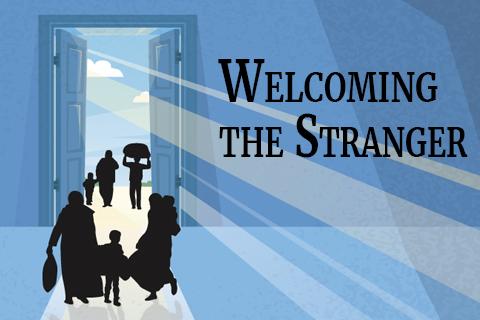
Catholics across the nation are preparing for massive changes in the arena of immigration to the United States — such as the threat of mass deportations — though no one knows what will happen after the Jan. 20 inauguration of Donald Trump.
President-elect Trump has promised to deport millions of undocumented migrants as soon as he takes office. But finding, arresting and deporting millions of people will take time and untold billions in funding, and the effort could be stymied by federal policies, laws and court decisions.
Still, Catholic groups, laypeople and religious are preparing for the worst: building networks, creating education campaigns, providing legal assistance, supporting immigrants and even setting up in-home medical care for those afraid to visit medical facilities.
Advertisement
Sr. Suzanne Jabro, founder of Border Compassion and a Sister of St. Joseph of Carondelet, told Global Sisters Report there is an unofficial network of women religious and inter-faith organizations in and around San Diego that is preparing for whatever is to come.
Jabro said she doesn't expect massive changes in immigration patterns, as the border is already largely closed to legal migration; asylum seekers that have filled out their paperwork in Mexico are not getting hearings on their cases.
Border Compassion runs a shelter for migrants on the south side of the U.S.-Mexico border in Mexicali, and Jabro said other shelters there are reporting the same thing — no one is getting appointments for a hearing.
"They've slowed [the process] down so much that those who have a credible fear and a right to a hearing, they're not going to get it," Jabro said, referring to the Biden administration.
If border policy tightens further, she said, that won't change much. But her organization is preparing to accept deportees at the Mexicali shelter if the Trump administration's plan to deport immigrants comes to fruition.
"But there's no light being shed on how this is going to be manifested," she said. And because of that lack of information, "People are scared to death."
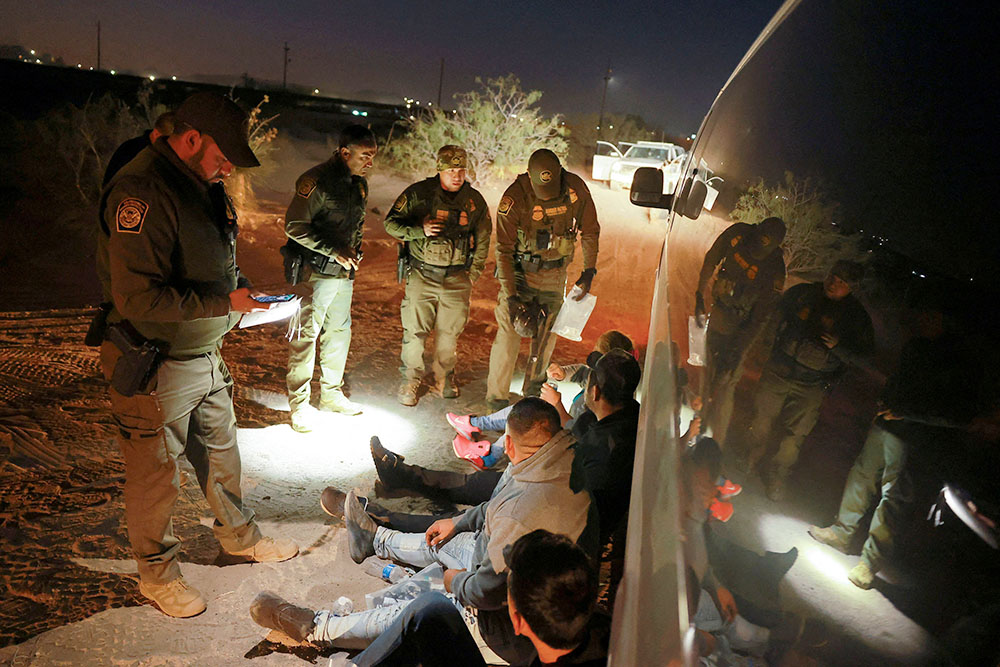
Migrants are detained by U.S. Border Patrol agents in Sunland Park, N.M., Oct. 24, 2024, after they crossed into the United States from Mexico. (OSV News/Reuters/Jose Luis Gonzalez)
Felician Sr. Maria Louise Edwards, a board member of Aguilas del Desierto (Desert Eagles), also said she doesn't expect much to change immediately. Aguilas del Desierto is a search and rescue organization that looks for missing immigrants who have braved the desert to cross the border — a harrowing eight-day journey that has resulted in thousands of deaths.
Edwards said the Mexican cartels control the border, charging $500 per person for those presenting themselves to border officials to ask for asylum or to go through the border wall and wait to present themselves to Border Patrol, or up to $10,000 to cross through the desert around the wall and border fencing.
The cartels are not going to give up their income, she said, and the cost will continue to limit the number of those who attempt the desert crossing, regardless of U.S. policy.
"I don't think the changes will be as dramatic as you might expect, because you cannot cross without paying the cartels," Edwards said.
She said her group is working to improve communications among its volunteers in the field and may increase the number of searches, but mostly is increasing its education efforts south of the border, warning people of the grave dangers they face. Edward said officials believe more than 10,000 people have died in the desert along the border, and most say that number is vastly underestimated.
Aguilas del Desierto has rescued about 1,000 people since it formed in 2012, and recovered almost 170 bodies of those who did not survive.
Further away from the border, it is the unknown that is motivating people.
In an interview with National Catholic Reporter, Margaret Martin, co-director of the Immigrant Refugee Services Division at Catholic Charities in New York, cited the atmosphere of fear and uncertainty that prevails among immigrants and even the staff at Catholic Charities. Many immigrants worry about potential changes to federal policies, fearing that they could be torn from their families or communities, she said.
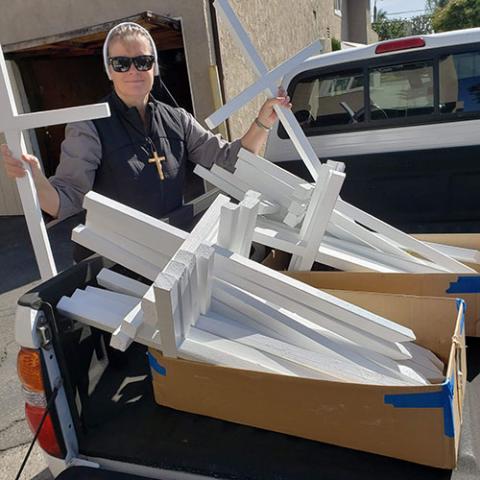
Felician Sr. Maria Louise Edwards, a board member of Aguilas del Desierto, shows the crosses her group uses to mark the places where the search and rescue organization recovers the bodies of people who have attempted to travel through the desert to cross the southern border into the United States. (Courtesy of Aguilas del Desierto)
This concern is particularly acute for those who have lived in the U.S. for a long time or have fled violence in their home countries. Staff members, too, share anxieties about what shifting policies could mean for their clients and the legal frameworks they rely on.
"It's always really hard to know what the outcome of any particular executive order or policy will be and when it will be," she said, noting the complexity of federal administration, court challenges and advocacy efforts.
Catholic Charities has been functioning as a lifeline for immigrants in New York, offering a range of services that cater to both documented and undocumented individuals. The organization provides legal assistance and case management, operating a hotline that receives tens of thousands of calls annually.
To address the new upcoming challenges, Catholic Charities has focused on outreach and education, preparing materials and presentations to inform communities about their rights and protections. Martin explained that one key message is that, for now, "nothing has changed yet," but the organization is ready to respond rapidly as policies evolve.
Martin also pointed to New York City's sanctuary status as a source of stability for many immigrants. The city's sanctuary laws ensure that immigrants can access city services, such as police and schools, without fear. "It ensures that our immigrant neighbors are protected from being automatically referred to federal immigration enforcement without due process, while also making clear that our law enforcement protects all New Yorkers," Martin said.
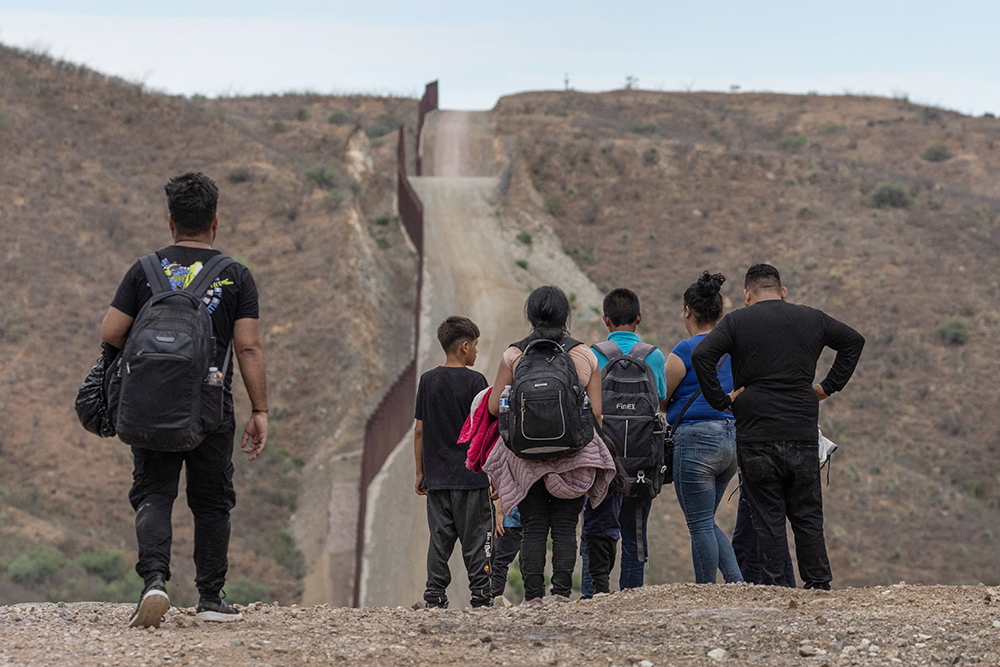
The Border Wall is seen in the background as migrants from South and Central America look to surrender to immigration officials after crossing into the United States from Mexico in Ruby, Ariz. June 24, 2024. (OSV News/Reuters/Adrees Latif)
Further north of New York City, in Syracuse, All Saints Parish, led by Fr. Fred Daley, has welcomed over the years hundreds of African refugees, primarily from Congo, the Central African Republic, and Rwanda, many of whom arrived through United Nations refugee programs. Their presence has transformed the parish, infusing its liturgical life with vibrant music, multilingual gospel readings, and a growing, young congregation.
"We're a young parish now," Daley said to NCR, noting that 50 children regularly attend the 11:30 Mass alongside a 25-member African young adult choir that sings in Swahili, French and Kinyarwanda. "They've brought wonderful new life to the parish."
Yet beyond the cultural enrichment, the parish's role has evolved into a critical support system for immigrants. All Saints Parish operates a task force dedicated to assisting refugees with essential needs, from securing housing and medical care to navigating the complexities of legal paperwork and employment. Volunteers work tirelessly to help families adjust to life in the U.S., a mission that has grown increasingly urgent as fears of deportation and family separation loom large within the immigrant community.
"There's a blanket of fear in the whole parish," Daley said.
The parish's commitment to sanctuary has been a cornerstone of its historic mission, he said, and extends beyond individual families. In collaboration with 15 other faith communities, All Saints Parish has formed an Interfaith Sanctuary Coalition, including Catholic, Methodist, Unitarian, Quaker and Congregational congregations, which is strategizing ways to support immigrants who may be afraid to seek medical care or leave their homes.
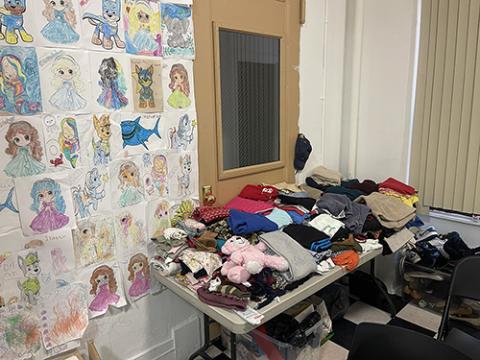
A desk with clothes and toys is pictured at the reception center for incoming immigrants at St. Teresa's Church, in Manhattan’s Lower East Side, December 2024. (Camillo Barone)
The coalition, originally formed in 2017 during the Trump administration, has assisted dozens of individuals and families through legal aid, transportation, and other forms of support. Now, as the political climate raises fresh concerns, the coalition aims to expand its reach and fortify its network.
Plans include mobilizing medical professionals to provide in-home care and educating immigrants on their rights through workshops, such as one that drew about 200 attendees on Nov. 9, right after Trump won the elections. "We're seeing a renewed effort to do everything we can," says Daley, expressing hope despite the challenges. The coalition, along with the city's sanctuary status and recent reassurances from local law enforcement, provides some solace, he said, as officials have pledged to respect church sanctuary protections.
Two sisters with New York City area-based congregations of women religious who did not want to be identified because of the sensitive nature of discussions, said it is too early to say what congregations might do if mass deportations actually happen.
One sister said that because the cost of deporting a large number of immigrants would be steep, she is skeptical that either federal or local immigration enforcement agencies have the resources to carry out large deportations.
"There's a blanket of fear in the whole parish."
— Fr. Fred Daley
But that is part of a larger picture of uncertainty, the sister said. "We're working in a bit of a void," she said.
This sister said "there are a lot of discussions" going on between and within congregations.
"Congregations, staff in faith-based immigration centers, both sisters and lay, and colleagues from other immigration advocacy organizations, are asking how they might respond," she told GSR, adding that "there is a lot of worry" and that immigration advocacy groups are beginning to advise immigrants about their legal rights.
"Groups are offering 'know your rights' workshops advising immigrants what their legal rights are now," the sister said. "There is concern that with the new administration, rights of immigrants will change. Right now, it is important that we be with and listen to our immigrant brothers and sisters and try to meet their needs."
"It's a time of grave concern," said another New York-area sister who works with immigrants. "Our constituencies are very worried."
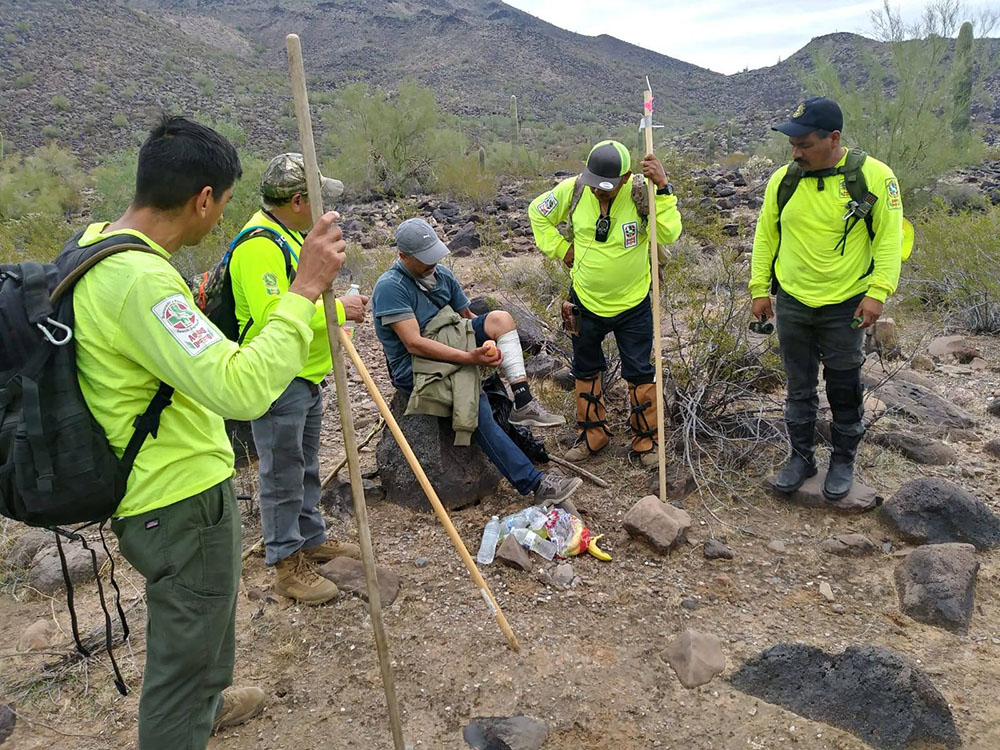
Volunteers from Aguilas del Desierto, a search and rescue organization, help an injured man they rescued in the desert as he was attempting to cross the southern border into the United States. (Courtesy of Aguilas del Desierto)
At a recent "know your rights" workshop that the sister held with other advocates, among the topics discussed were how to respond to law enforcement should they come to an immigrant's door, creating a safety plan for families, and the importance of not missing immigration court dates.
"Tears and anxieties were visibly present in the room, as they expressed over and over their concerns of being detained themselves and then separated from their children," the sister said. "It is a scary time for all."
Some congregations are discussing the implications of 1980s-era "sanctuary" actions, in which U.S. churches and faith communities offered shelter for those arriving in the United States after fleeing the wars in Central America.
But that kind of response will require careful and thoughtful deliberation within congregations, the sister said, given that congregations tend to have good relations with local police agencies — agencies that might be deputized by federal authorities to carry out deportation actions.
"It's going to be a challenge," the sister said of the coming months. "It's untested."






